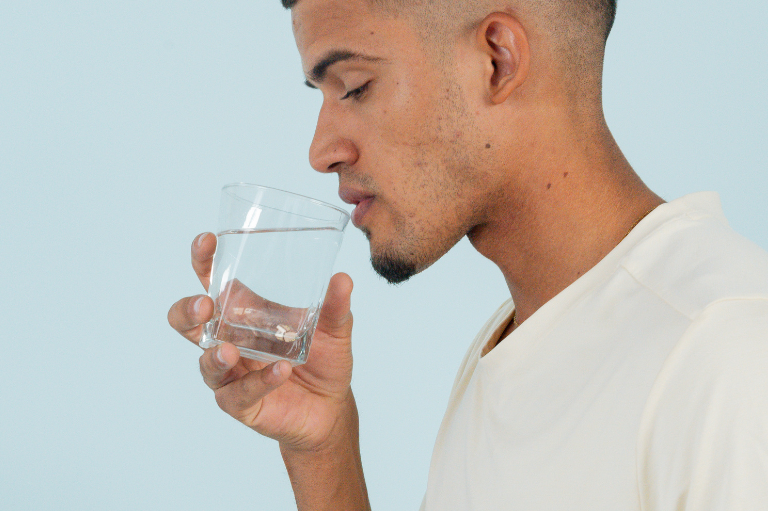Are you sure you want to leave Marta Valls Martin's MyShop site?
Are you sure you want to leave Marta Valls Martin's MyShop site?
Are you sure you want to leave Marta Valls Martin's MyShop site?
Are you sure you want to leave Marta Valls Martin's MyShop site?

Written by: Kelsi Irvine, 4Life Research and Development Scientist
Water is the most essential part of our diet. Human beings can go weeks without food but will expire in mere days without access to water. For something so essential to our health, it’s strange that we often forget to prioritize drinking water throughout the day.
The CDC estimates the average adult drinks about 44 ounces of water daily. While recommendations vary based on age, weight, and gender, most recommend drinking around 64-100 ounces each day.1 For most people, there are a lot of easy ways to avoid dehydration. Staying hydrated is important for all systems in your body including your immune function, muscles, and major organs. By making a few simple adjustments to habits and daily routines, you can improve your hydration and your overall health!
Adequate water intake is vital for optimal bodily function. While it is important for everyone to drink enough water, certain groups should pay extra attention to their hydration levels. Athletes, children, and the elderly should take particular care to drink enough water because they may be more prone to dehydration. Additionally, anyone who is ill, pregnant, or breastfeeding will need to consume more water due to fluid loss. Apart from putting strain on organs, a deficiency of fluids can lead to confusion, fatigue, mood disruptions, dizziness, irritability, and excessive thirst.2,3
Good hydration is essential for the proper functioning of body systems. When the body experiences dehydration, blood volume decreases. Decreased volume means there is less blood for the heart to pump throughout the body. This puts strain on the heart because it needs to beat faster to circulate blood carrying oxygen and essential nutrients to cells. Dehydration can increase heart rate and raise blood pressure.4
The kidneys are another important organ affected by hydration. The kidneys allow the body to regulate how much water is retained or excreted, which helps cells stay in a balanced state called homeostasis. When there is too much water in the body, the kidneys send fluid out through urination. However, when water becomes less abundant, the kidneys work harder to conserve fluid. They require extra energy to filter the blood and eliminate toxins. You can help keep your heart, kidneys, and other organs healthy by drinking plenty of water consistently throughout the day.2
Immune cells keep the body safe from potential health threats using the bloodstream. The bloodstream carries cells that patrol the body for health threats and cells that fight against those threats. Dehydration can decrease the immune function response to health threats.5 Keeping the immune function running properly is important for supporting overall health.
Additionally, the body has incredible natural defenses including barriers such as the skin, saliva, and mucous membranes which help keep out and remove health threats. The body requires water to produce and support these amazing innate immune health defenses. Dehydration can lead to a decrease in proteins found in saliva that help protect the body against health threats. Drinking water can help replenish those important defense proteins in the saliva.6
Immune function impacts so many areas of health, and drinking plenty of water is one way you can support and protect your immune health. This is just another reason it is so important to stay hydrated!
Electrolytes are another essential element of hydration that help keep cells healthy and in homeostasis. Electrolytes are nutrients composed of salt, magnesium, potassium, and other essential minerals. When you are physically active, your body loses electrolytes through sweat. When you are exercising or sweating a lot, it is important to rehydrate with a beverage that contains electrolytes.2
When your body overheats, you sweat to maintain a proper core body temperature. This is an important thing to keep in mind for those who live in warm climates and may need to drink more to stay hydrated. Proper hydration is essential in preventing heat stroke or heat exhaustion, especially in children and the elderly.2 Stay hydrated and consider finding a source of electrolytes you enjoy such as an energy beverage or powder you can add to water.

Prioritizing hydration is key to maintaining optimal health and supporting a robust immune function. By making simple adjustments to your daily routine, you can easily improve your hydration levels and overall well-being!
Sources
1. How Much Water Do You Need?
2. Water, Hydration and Health
3. Water: How Much Should you Drink Every Day?
4. The Importance of Water - The Heart Foundation
5. Alleviating Effects of Dehydration under No Hyperthermia on the Immunomodulatory Response to the Polysaccharide Fraction from Fu-Ling in Male Collegiate Wrestlers
6. Dehydration Decreases Saliva Antimicrobial Proteins Important for Mucosal Immunity
7. Clinical study on the rapid immune modulating effects of 600 mg of 4Life Transfer Factor Blend compared to placebo. G. Jensen, NIS Labs Report 058-006.
You are trying to view a MyShop page. Please log out in order to view this website.